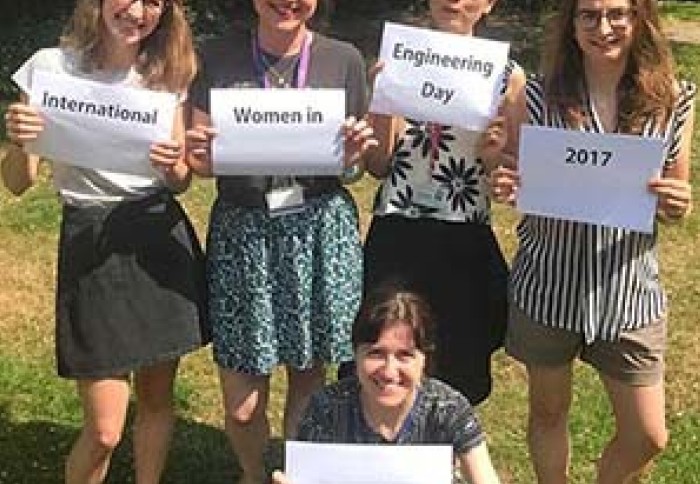Women in Engineering Day: Q&A with Dr Julia Sachs
by Zara Qadir

For National Women in Engineering Day (23rd June), we asked Dr Julia Sachs, a researcher at the SGI, TEN questions about her career
Julia studied Engineering Cybernetics at the University of Stuttgart.
Following her PhD, she is now working on a new energy systems model, MUSE in the Department of Chemical Engineering at Imperial College.
1. Why did you decide to work in engineering?
It was a very multidisciplinary course. We literally studied every kind of system there is, which included self-driving cars, chemical refineries/factories to biological organisms.
It’s basically about modelling, analysis and control of dynamic processes (e.g. the automatic navigation of ships, the modelling of complex mechanism in cells).
2.What drew you to engineering?
I really like mathematics and natural sciences. But I wanted to do something that was applied and not just theoretical.
Although I’m interested in the technical side, I like that in engineering you have to consider also the social, ethical and environmental implications.
3.What are the social and environmental issues that engineers could solve?
If you look at the UN development goals, engineering is instrumental in solving global challenges. For example, providing shelter, ensuring food security and cleaner water, improving health and infrastructure etc.
I now work in the energy area, and it’s great to be working on finding solutions to tackling climate change.
4. What misconceptions do you think people have of the sector?
A lot of people think it’s quite narrow but it’s a very varied field.
The word ‘Engineer’ does not really mean that much. Often, people just think of mechanical engineering. But there are so many different fields.
I don’t work in a lab which is another misconception some people have of engineers.
5.What three tips would you give to someone considering a career in engineering?
- It’s definitely a good degree to have.
- There are lots of opportunities.
- You can also easily change into other disciplines as it gives you a good foundation.
6.What are you working on at the moment?
Our team are working on generating a computer model of the global energy system. It’s called MUSE and will be launched soon.
The aim of the model will be to explore which technologies could make a significant impact on the cost of energy, and reduce greenhouse gas emissions.
I am working on modelling the building sector. Buildings account for almost a third of final energy consumption globally and are an equally important source of CO2 emissions.
7. What does your day-to-day work involve?
I do a lot of programming, data collecting and processing, and attend a lot of planning meetings with the other ten modelers. I also supervise some students.
I also attend conferences in the UK and abroad. My next trip will be to present my work at the International Energy Workshop in July in the US.
8. A large component of MUSE involves coding or programming. What does that involve?
It sounds to some people pretty dry or unappealing, but it is quite creative. You have to find a way to solve the problem mathematically.
For example in modelling the building sector in MUSE, I had to find a way to estimate the future energy service demand for both commercial and domestic use.
This involves the mapping of climate conditions and settlement structure on a global scale to estimate how much heat demand there is in different locations.
We also examine factors that influence consumer behaviour and try to understand how behaviours might change in the future.
9. Diversity in tech is startlingly low. Women make up just 27% of the digital workforce. Why is diversity so important?
Often women and men approach problems differently, and this is useful in problem solving.
There are also a lot of talented women, often first in their class in high schools, and the sector could definitely profit from this additional capability. I think this would help to drive innovations.
Diversity also greatly improves the work climate, a mix of women and men creates a balanced work environment.
10. Why are days like International Women In Engineering Day important?
I think it’s important day because it connects women working in engineering and also highlights the contributions they have made in the field.
I also think it makes more high school students (girls) aware of both the possibilities and of the various amazing women working in the field.
Article text (excluding photos or graphics) © Imperial College London.
Photos and graphics subject to third party copyright used with permission or © Imperial College London.
Reporter
Zara Qadir
Department of Earth Science & Engineering

